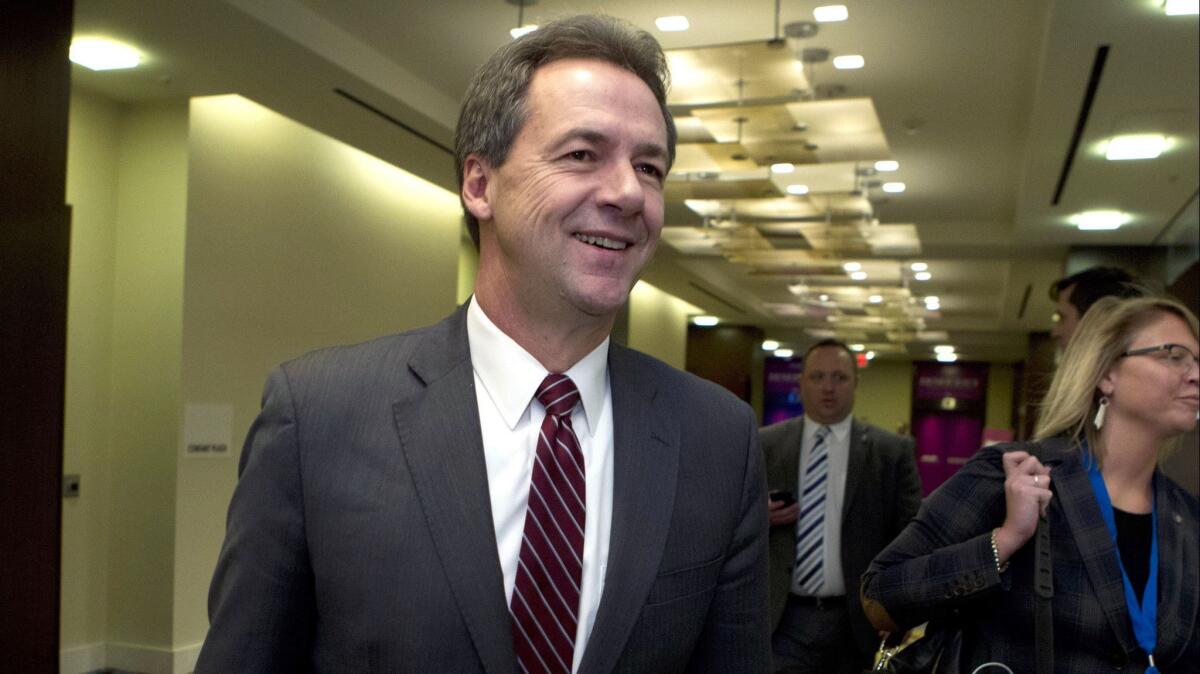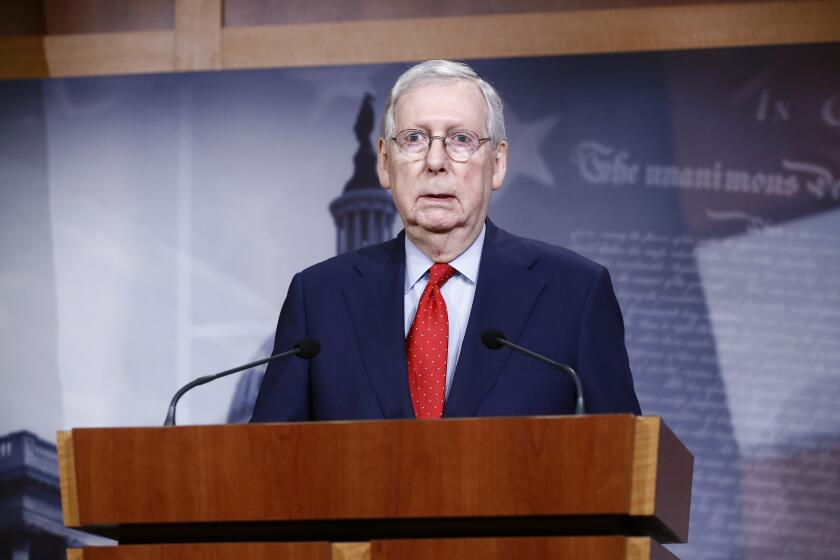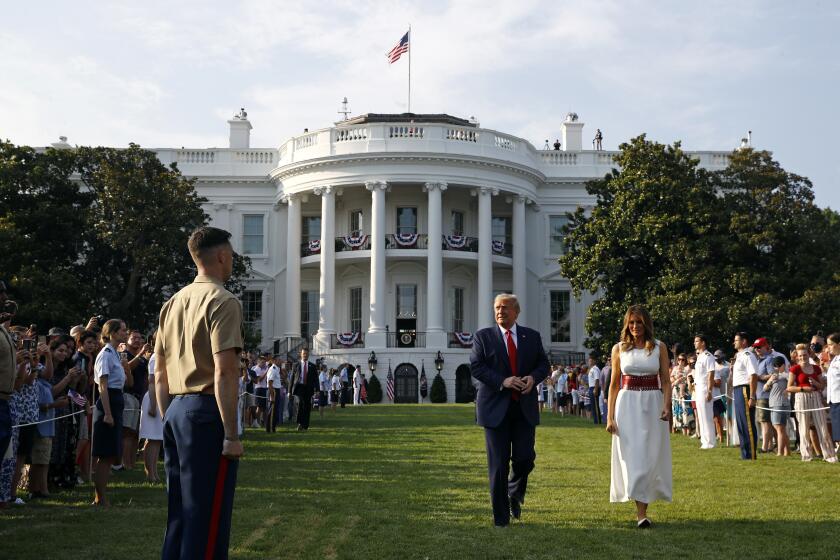With a Senate majority in reach, Democratic candidates rake in massive donations

A group of Democratic challengers to incumbent Republican U.S. senators has once again posted massive fundraising numbers, raising the party’s hopes of reclaiming the Senate from the GOP in the November election.
The Democrats’ figures, which include donations between April and June, are all the more impressive for coming while the nation underwent a historic economic crunch because of the COVID-19 pandemic.
Montana Gov. Steve Bullock, challenging Republican Sen. Steve Daines, reported raising $7.7 million in the year’s second quarter. Maine House Speaker Sara Gideon raised $9 million over the same period in her contest against Republican Sen. Susan Collins. Former North Carolina state Sen. Cal Cunningham reported a $7.4-million haul in his bid against Republican Sen. Thom Tillis.
The fundraising spree has extended into typically deep-red South Carolina, where former state Democratic Party Chair Jaime Harrison amassed $13.9 million over the quarter in a showdown with prominent Republican Sen. Lindsey Graham. In Kentucky, former combat pilot Amy McGrath’s campaign reported raising $17.4 million for the quarter in her challenge against GOP Senate Majority Leader Mitch McConnell.
“Some of these Democratic challengers are raising crazy amounts of money for a single quarter,” said Sheila Krumholz, executive director at the nonpartisan Center for Responsive Politics, which tracks political spending. “The average winning Senate candidate last cycle spent a total of $15.7 million for the cycle.”
The Republican candidates have not yet posted their figures. Campaigns tend to release fundraising numbers earlier when they’ve had a strong quarter, experts say.
Krumholz said the Democratic totals were “extraordinary,” because just a few months ago, several of the Democratic challengers would have been viewed as “long shots” who “would have had great difficulty raising this kind of money.”
The huge hauls are just the latest in a series of alarm bells for the GOP, whose leader, President Trump, significantly trails Democratic former Vice President Joe Biden in the polls and has flailed in recent months with his responses to a historic pandemic and an impassioned activist movement for Black lives.
Republicans, once confident of keeping their Senate majority in the fall election, now fear Democrats have a fresh advantage as the coronavirus crisis has reshaped campaigns.
In polling that only tests party affiliation, generic congressional Democratic candidates lead GOP candidates by more than 10 percentage points, according to an average by Real Clear Politics. The Democratic fundraising crush raises the prospect that the Republican Party might reprise its disastrous showing in the 2018 midterm, when Democrats took over the House of Representatives.
A “green wave” of Democratic cash in that midterm “was just far too much for Republican incumbents to overcome, and [Democrats] ended up picking up and flipping the House, and I think these are sort of the telltale signs we are seeing in the Senate as well,” said Jessica Taylor, the Senate and governors editor at the nonpartisan Cook Report, which tracks elections.
Of the 35 Senate seats up for election this cycle, 23 are held by Republicans, giving Democrats multiple opportunities to pick up the three seats needed to claim a majority in the chamber.
“The problem for Republicans is that Democrats are going to have the resources to get their message out and keep expanding the map in our direction by putting more Republican seats in play,” said Stewart Boss, national press secretary for the Democratic Senatorial Campaign Committee. “Not just Arizona and Colorado, but South Carolina and Kentucky, where those are tougher states.”
National Republican Senatorial Committee communications director Jesse Hunt said in a statement that “Democrats will need to spend every penny to defend records that are disqualifying in the eyes of mainstream voters who will decide the outcome in key Senate races. Personal scandals and a party rallying around a socialist agenda are problems money can’t solve.”
Nathan Gonzales, editor and publisher of Inside Elections, a nonpartisan newsletter, thinks that “the biggest surprise is that these monster fundraising quarters are no surprise anymore,” saying that Democrats overall have taken impressive fundraising loads in the last three years.
“There’s one key motivator for Democratic donors, and I think that’s President Donald J. Trump,” Gonzales said. He thinks a similar phenomenon is driving donors to the opponents of McConnell and Graham, whose seats are not considered toss-up races.
“These are some of the highest-profile members of the Republican Party. Democratic donors are reacting to their dislike of those senators,” Gonzales said, adding that the Democratic spending will likely force the GOP to direct more resources to what had normally been considered safe seats.
“The Republicans can’t just walk away and let Lindsey Graham and Mitch McConnell get outspent by $30 million,” Gonzales said. “That’s not a position you want to be in, even if the state is trending in your direction.”
GOP lawmakers, Trump surrogates tread carefully on president’s inflammatory remarks over the Fourth of July weekend, denounced by Democrats.
More to Read
Get the L.A. Times Politics newsletter
Deeply reported insights into legislation, politics and policy from Sacramento, Washington and beyond. In your inbox three times per week.
You may occasionally receive promotional content from the Los Angeles Times.













